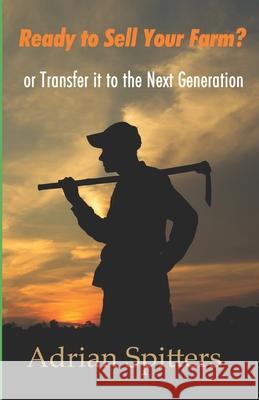Ready to Sell Your Farm?: or Transfer it to the Next Generation » książka
Ready to Sell Your Farm?: or Transfer it to the Next Generation
ISBN-13: 9781895112481 / Angielski / Miękka / 2017 / 102 str.
Most farmers don't have time to think too far ahead into the future. That's because they're busy attending to the needs of today: producing high-quality products, overseeing employees, and managing the mind-boggling number of details that go into owning a farm. If they do think about the future, it's usually in terms of new government regulations, availability and price of land or quota for future expansion, or even what the weather will be like. The truly long-term decisions, like when to sell or transition your farm (not to mention how to do it), are mentally filed away under the heading, "Bridges to Cross when I've come to it." But that bridge may be a lot closer than you think. Understandably, most farmers have great difficulty in setting aside the time to plan for the future of their farm business in addition to working on their farm. It is the planning for the future of your farm while the sun is shining that will help protect your farm, and ultimately your family, from the rainstorms that loom ahead. You see, recently conducted surveys of privately-owned family businesses, including farms across North America, report that approximately 40% of business owners expect to exit their family business in the next five years. That number goes up to a whopping 70% within the next ten years. A significant number of these business owners indicate that they will be relying on the ongoing success of their business to finance their future lifestyle. All this applies to farmers like you. So, ask yourself: 1. Do you have a plan in place to increase the value of your farm before it's time to sell? 2. Do you have a plan in place that will enable you to transfer your farm to your family or sell to a third party? 3. Have you planned how to retire on your terms, instead of being forced to transfer or sell your farm on someone else's? 4. Are you proactively preparing a successor who will enable the continuity of your farm operation? It's true: most farmers haven't planned for the day when they will transition or sell their farm. That makes them vulnerable to an involuntary sale, meaning they will be forced to sell their farm due to death, disability, or other reasons. As you can see, the question of when and how to transition your farm is something that needs to be answered sooner rather than later. The first step is to have a plan. Having a plan in place now can save you untold time and trouble in the future... and it can also help ensure that when the time does come to transition your farm, you do it right. The stakes are high. For an overwhelming number of farmers, the sale of their farm will be their primary source of income for retirement. That's why it's crucial that they get it right. Otherwise, they will deny themselves the chance at much-needed income during a time when every dollar counts. For others, their major goal is to keep their farm in the family. But transitioning your farm, even to your own children, is a long and complex process. Finally, everyone wants to cement their legacy and good name long after the transaction takes place. I know that farmers are also business owners... and that your business is one of the most important in the entire world. I understand that owning a farm isn't easy. I also know that the decision to one-day sell or transfer out of your farm can be just as difficult. My name is Adrian Spitters. I'm a Senior Wealth Advisor with Assante Capital Management Ltd. As the child of a farmer, I can appreciate the hard work you've put into establishing a successful farm. I've prepared this special book just for you. In just a few short pages, we'll look at some of the challenges facing farmers who want to quit working someday, what the most successful farmers are doing now, and where you can get additional help. One of my goals is to give you ideas of how to plan for your eventual transition into retirement and have peace of mind.











